Iron Age - Available - Photo gallery
Image database with photographs of ancient art and antiquities
Our image database provides photographs of ancient art and antiquities for press releases as well as for private use. All artefacts sold in our gallery are documented through professional photographs. The resulting image library contains numerous ancient Egyptian, Greek and Roman antiquities as well as ancient coins. The time span from Stone Age, over Bronze Age and Classical Antiquity until Late Antiquity is covered.The photo gallery aims at providing a vast visual archive equipped with filters and search tools. You are most welcome to search the constantly growing number of artefacts in the image library. We are also happy to authorize hyperlinks from your webpage / forum to the objects depicted in our gallery. For this purpose, please send us a short notification prior to placing a hyperlink. For almost every object high definition photographs are available and can be provided e.g. to document your collection or for scientific papers or popular science articles. If you are interested in using pictures for publications, print media or other purposes, please contact us and we will be happy to assist you.
-
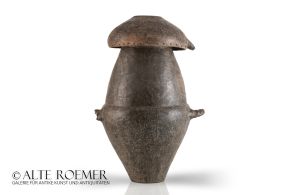 Biconical early Etruscan urn with original lid
Biconical early Etruscan urn with original lidImpressive ensemble, nicely preserved. Ex Mara Scotoni-Coppetti collection, inspected and restored at the Archaeological Institute of the University of Zurich in 1981.
 Cypriot limestone statuette
Cypriot limestone statuetteYoung man with a bag in his hand, in the style of a kouros. The typical votary statuette from Cyprus was exported to Israel in the Cypro-Archaic period. With certificate from 1984.
 Torso of an Egyptian striding figure
Torso of an Egyptian striding figureAn elaborate, small private portrait from the Middle Kingdom of Ancient Egypt. Made from beautifully textured granodiorite. With certificate from 1975.
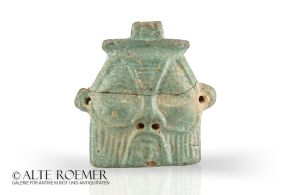 Egyptian amulet of a Bes mask
Egyptian amulet of a Bes maskProtective amulet in the form of a mask of the god Bes made of mint green faience. Great specimen from Ptolemaic Egypt.
 Published Canaanite oil lamp from Adler collection
Published Canaanite oil lamp from Adler collectionShallow bowl with pinch for the wick, typical for the late Iron Age in Southern Israel. From the famous Judge Dr. Steve Adler collection. Exported from Israel with IAA permit Nr. 53397.
 Roman legionary tile from the Rhineland
Roman legionary tile from the RhinelandLEG XVI (Gallica), 43 - 70 AD. Found 1966 till 1981 near the Roman city of Novaesium, today's Neuss in Germany. Novaesium was an early Roman foundation and with this is one of the oldest cities in Germany.
 Neolithic axe head
Neolithic axe headNicely crafted tool made of beige stone. From the New Stone Age of Europe. A specimen of the thick butted type with thin blade.
 Neolithic axe head
Neolithic axe headNicely crafted Stone Age tool made of wonderful light green jadeite. From southern France.

 Neolithic dagger blade from Denmark
Neolithic dagger blade from DenmarkDouble-edged, pointed blade made of beautiful flint. The blade was for a dagger, the typical status symbol from the transitional period between Late Neolithic and Early Bronze Age.
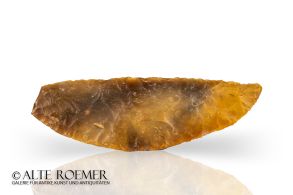 Neolithic flint sickle from Denmark
Neolithic flint sickle from DenmarkCrescent-shaped blade made of beautiful brown flintstone. This tool represents an intermediate state within the radical transition from Neolithic to Bronze Age.
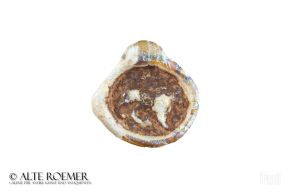 Byzantine glass pendant from Judaea
Byzantine glass pendant from JudaeaThe pendant with an ibex motif was worn as a lucky charm or protective amulet. Made in the early Byzantine period in a glass workshop in Judaea.
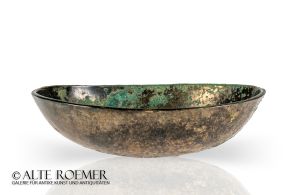 Sasanian silver bowl
Sasanian silver bowlGood example of high quality Sassanid craftsmanship. Acquired at Sotheby's in 1981.
 Athenian fish plate
Athenian fish plateVery nicely preserved. From an old German private collection, acquired in the early 1950s.
 Luristan hatchet with eyes
Luristan hatchet with eyesAxe head originating from the Luristan region during Iron Age. The piece is decorated with eyes to form a stylized bird's head.
 Luristan axe head
Luristan axe headBronze axe originating from the Luristan region during Bronze Age. From the Sasson family collection.
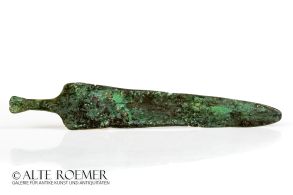 Luristan bronze dagger
Luristan bronze daggerDouble-edged blade of a short dagger from the Luristan region in Ancient Iran. An early type from the Middle Bronze Age.
 Luristan bronze dagger
Luristan bronze daggerDouble-edged blade of a dagger from the Luristan region in Ancient Iran. An early type from the Middle Bronze Age.
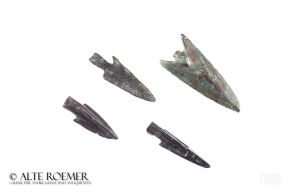 Four Scythian arrow heads
Four Scythian arrow headsGroup of four arrowheads made of bronze in excellent condition. Popular weapon of the cultures of the 1st Millennium BC.
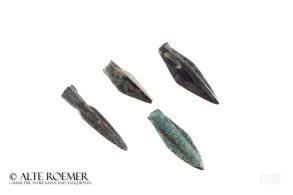 Four Scythian arrow heads
Four Scythian arrow headsGroup of four arrowheads made of bronze in excellent condition. Popular weapon of the cultures of the 1st Millennium BC.
 Very large Italic wave-shaped brooch
Very large Italic wave-shaped broochMade from bronze wire. A very rare brooch type from around 1000 BC.
 Early Etruscan sanguisuga fibula
Early Etruscan sanguisuga fibulaThe early Etruscan bronze brooch is characterized by its artistically decorated bow. A find from northern Italy.

 Neolithic flint dagger from Denmark
Neolithic flint dagger from DenmarkDouble-edged blade and flat shaft made of beautiful flintstone. A status symbol from the transitional period between Late Neolithic and Early Bronze Age.
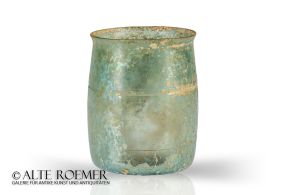 Roman glass beaker
Roman glass beakerBeautiful turquoise glass with incised decorative grooves. From the 1st or 2nd century AD.
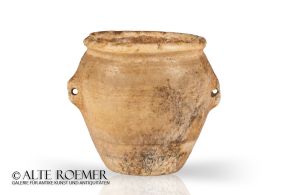 Egyptian stone beaker
Egyptian stone beakerElegant stone vase made of beautifully marbled calcite alabaster. From between the 1st and 3rd dynasty of ancient Egypt.
 Apulian-Corinthian bronze helmet - ex Axel Guttmann collection
Apulian-Corinthian bronze helmet - ex Axel Guttmann collectionWorth the exhibition in a museum. With fine decoration including large boars. Published by H. Born (1993) and M. Junkelmann (2000). Ex Christie's London and Royal Athena Galleries New York.
 Large Italic serpentine fibula
Large Italic serpentine fibulaA bronze brooch dating to the Italic Iron Age. The piece is elaborately adorned by wonderful incised decorations.
 Early Etruscan sanguisuga fibula
Early Etruscan sanguisuga fibulaThe early Etruscan bronze brooch is characterized by its artistically decorated bow. A find from northern Italy.

 Disc brooch from Roman Britain
Disc brooch from Roman BritainBrooch with a Romano-Celtic sunburst design. Circa 2nd century. A find from Roman Britain
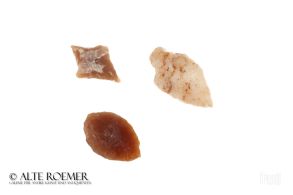 Three neolithic arrowheads from Egypt
Three neolithic arrowheads from EgyptThe Stone Age points are finely crafted and in a good state of preservation. From a 100 year old museum collection.
 Three neolithic arrowheads from Egypt
Three neolithic arrowheads from EgyptThe Stone Age points are finely crafted. From a 100 year old museum collection.
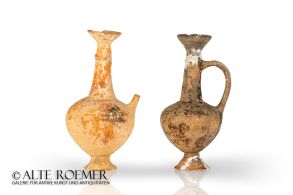 Two cypriot juglets
Two cypriot jugletsSo-called Bilbil jugs of the Base Ring I ware. A testament to the opium trade of the late Bronze Age.
 Luristan bronze standard with master of animals
Luristan bronze standard with master of animalsBronze finial from Iron Age Northern Iran. Decorated by stylized panthers and a janus headed hero or god. Possibly a teraphim, a house god, as referred to in the Old Testament.
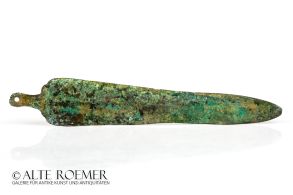 Luristan bronze dagger
Luristan bronze daggerDouble-edged blade of a short dagger from the Luristan region in Ancient Iran. An early type from the Middle Bronze Age.

